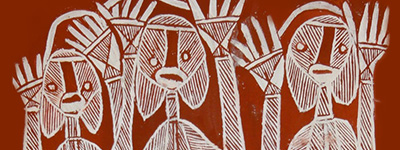Bininj Kunwok
Triangular Kinship Terms

na-ngalayngu
|
Audio |
|
|---|---|
|
Word Stem |
ngalayngu |
|
Etymology |
possibly Yolngu galay 'cross cousin/wife' plus archaic 2nd person possessive suffix -ngu (as in Dalabon) |
Definitions |
|
|
#1 |
na-ngalayngu you are my BC, my kanjok/spouse, your MB. The term appears to be tucentric because of the archaic second person possessive suffix but the same term is used as a reciprocal, which possibly negates that argument,. The term is used mostly in contexts where a parent’s sibling is the referent (MB or FZ). |
|
#2 |
na-ngalayngu you are my FZ, my MB, your kanjok or spouse. The term appears to be tucentric because of the archaic second person possessive suffix but the same term is used as a reciprocal, which possibly negates that argument,. The term is used mostly in contexts where a parent’s sibling is the referent (MB or FZ). |
|
#3 |
na-ngalayngu you are my na-kurrng ‘FZDS’, my MB (or possibly also ZS), your barnka (skewed father ‘FZS>F’). The term appears to be tucentric because of the archaic second person possessive suffix but the same term is used as a reciprocal, which possibly negates that argument,. The term is used mostly in contexts where a parent’s sibling is the referent (MB or FZ). |
|
#4 |
na-ngalayngu you are my na-kurrng ‘MMBS’, my barnka (skewed father ‘FZS>F’), your MB (or possibly also ZS). The term appears to be tucentric because of the archaic second person possessive suffix but the same term is used as a reciprocal, which possibly negates that argument,. The term is used mostly in contexts where a parent’s sibling is the referent (MB or FZ). |
|
#5 |
na-ngalayngu you are my na-kurrng ‘MMBS’, my MB, your cross cousin. The term appears to be tucentric because of the archaic second person possessive suffix but the same term is used as a reciprocal, which possibly negates that argument,. The term is used mostly in contexts where a parent’s sibling is the referent (MB or FZ). |
|
#6 |
na-ngalayngu you are my brother (female propositus), our ngadjadj 'MB'. The term appears to be tucentric because of the archaic second person possessive suffix but the same term is used as a reciprocal, which possibly negates that argument,. The term is used mostly in contexts where a parent’s sibling is the referent (MB or FZ). |
|
#7 |
na-ngalayngu you are my eB (male propositus), my MB, your MB. |
|
#8 |
|
|
#9 |
na-ngalayngu you are my yB (male propositus), my MB, your MB. |